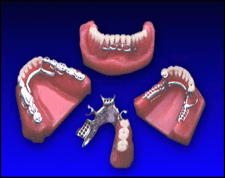المقالات
Overdentures

Loose or painful teeth are usually caused by advanced periodontal disease. If many of your teeth have become loose or painful, it may be too late for us to save them. In such a situation, removing some of your teeth and replacing them with an overdenture may be the best way to avoid infection and restore health to your mouth.
From the outside, an overdenture looks just like a regular denture. With a regular denture, when all of your teeth are removed, it causes the bone in your jaw to recede. However, when we place an overdenture, we are able to retain some of your natural teeth, using them to anchor the denture. By leaving some of the roots of the teeth in place, we can significantly fend off bone loss and provide you with a more stable denture.
Some temporary problems are a normal part of adjusting to new dentures.
* At first, the denture may tip when you chew.
* It may seem bulky, and you may gag a little.
Remember, these problems are a normal part of the adjustment process, and they are temporary. As you get used to your new denture, you'll be eating and speaking with confidence, and you'll be on your way to restored oral health!
To prepare the teeth that will support your overdenture, we first remove the portions of the teeth that extend above the gum line. Next, we perform root canal treatment on these teeth to remove any trace of infection. We may also cover them with small metal caps for added protection.
To begin the process of making an overdenture, we take impressions and use them to make precise working models of your mouth; the denture is made on these models. We'll work with you to select the best color and shape for your new teeth.
A dental implant being inserted Unless you're in a lot of pain, you might decide to leave your teeth as they are, at least for now. But delaying treatment can be a risky alternative. If your teeth and gums are infected, they will never heal on their own. They'll just keep getting worse. Infections of the teeth and gums can lead to further tooth loss and can drag down your body's immune system, affecting your entire body.
Taking all of your teeth out and making an immediate denture may be an alternative to an overdenture.
An implant is a small metal cylinder that's surgically inserted into the bone of the jaw to replace the roots of missing teeth. Implants would make your new denture much more stable, and they also slow the bone loss that occurs after teeth are removed.
Another alternative to overdentures is using the remaining teeth to anchor a partial denture.
Whenever teeth are removed, the bone in your jaw begins to recede. If we leave some of the roots of the teeth in place and place an overdenture, we can slow bone loss significantly and give you a more stable denture.
